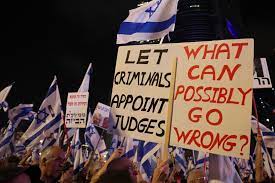Thousands of protestors flocked to the streets of Israel, showing disapproval of the controversial judicial overhaul bill. The bill proposed by far-right Prime Minister Benjamin Netanyahu is set to be put to vote in Israel’s parliament, the Knesset, on Monday, after a discussion on Sunday.
The protests have been organized every Saturday for 29 consecutive weeks since the proposal was put forward. On July 22, huge masses of demonstrators gathered in the streets of Tel Aviv, West Jerusalem, Beersheva, Herzliya, and Kfar Saba, in a last-moment show of force on the eve of the discussion followed by the vote.

The early hours of Sunday saw hundreds of protestors in Israeli-occupied east Jerusalem, praying at the Western Wall, the holiest place for Jews. Human chains, flag-waving, slogan-chanting crowds arrived at Israel’s parliament from a four-day, 75km march from Tel Aviv.
What is in the overhaul, and why is it contentious?
The judicial overhaul proposes a bill that a simple majority would allow the Parliament to overturn any decision of the Supreme Court on the grounds of “unreasonableness.” It would also give the parliament the veto in selecting judges. This would significantly limit the Supreme Court’s orders.
Although the government says the proposal is meant to curb the powers of unelected judges, Israeli masses view the move as a blow to democracy and a shift towards autocracy.
According to an Al Jazeera reporter, most of the protestors believe that the bill will pass the second and third reading before becoming law.
Brief background:
Prime Minister Netanyahu is on trial for corruption charges. Protestors say he and his allies are trying to make the judicial reform in order to suppress any possible judgments against him. The Prime Minister has denied this allegation. People opposed to the overhaul believe the PM wants to appoint allies to key government posts and increase Israel’s influence in the occupied West Bank.
Israel does not have an existing constitution, making its democratic foundation unsteady. The Knesset is a one-chamber parliament, and the president’s post is merely ceremonial. Therefore, The Supreme Court is viewed as a protector of rights and law and a checker of executive power.
A weak judiciary would mean an unbalanced power with an orthodox, male-dominated, far-right government. This is especially anxiety-inducing for minorities such as Palestinians, women, and the LGBTQ community.
Who else is opposed?
POTUS Joe Biden has urged Netanyahu to halt the plan and gather consensus before making constitutional changes.
Medical leaders and business persons have also sharply criticised the proposal. A number of military reservists are planning to stop reporting for duty if the proposal passes. 10,000 Israel Defense Service personnel have refused voluntary duty today. The National Unity Party Leader Benny Gantz says, Politicizing the military “is a national mistake and it’s a very grave leadership failure.”
Dozens of former ambassadors have written to Prime Minister Benjamin Netanyahu, urging him to stop the controversial judicial overhaul.

Other developments:
After undergoing an unexpected “pacemaker” procedure for the heart, Prime Minister Benjamin Netanyahu’s doctors said he was “doing very well.” A new wave of uncertainty hit the state as the leader was suddenly rushed to the hospital early Sunday. Despite some confusion and chaos about the vote, Netanyahu’s government pressed for the discussion to carry out on Sunday as planned.











